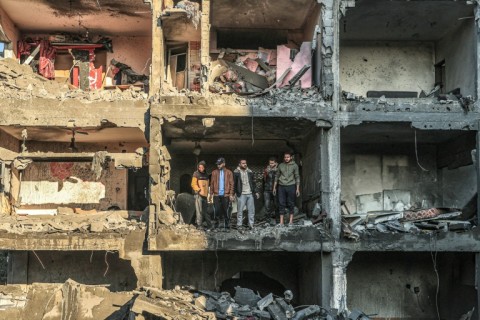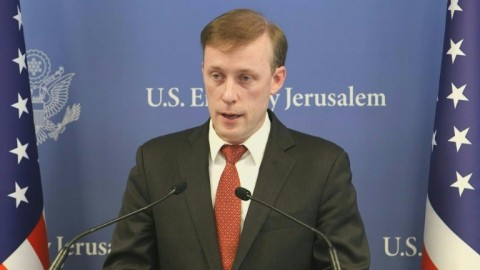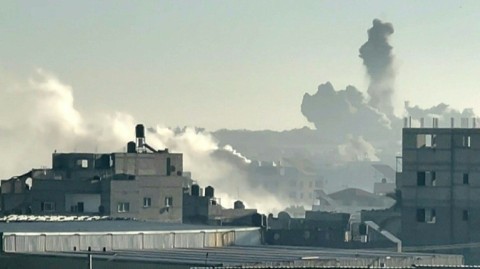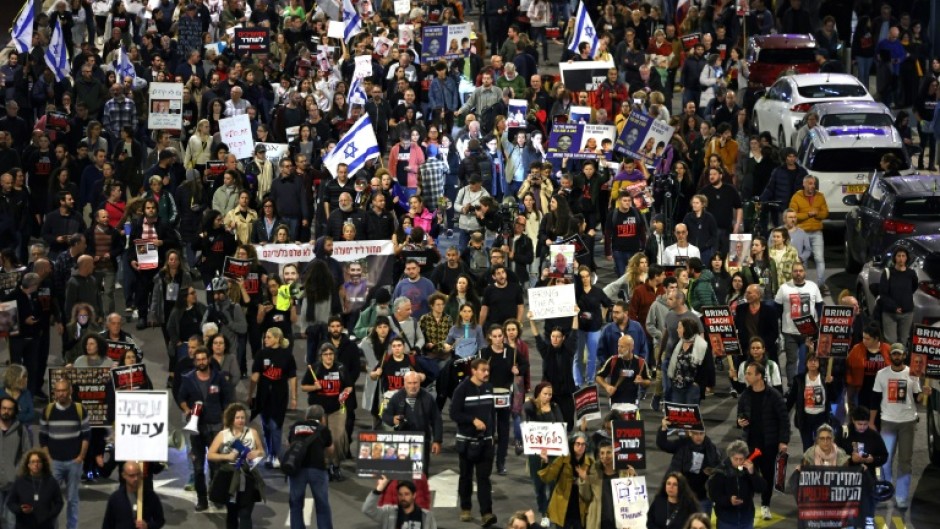TEL AVIV - Israel said its troops had killed three Gaza hostages after mistaking them for a threat, with the armed forces expressing "deep remorse" over a "tragic incident" that sparked protests in Tel Aviv.
The Israeli military said Yotam Haim, Alon Shamriz and Samer El-Talalqa were shot during operations in a neighbourhood of Gaza City.
The trio were among those kidnapped during Hamas's raids into Israel on October 7, which killed 1,200 people, mostly civilians, and saw an estimated 240 hostages taken, according to Israeli authorities.
Prime Minister Benjamin Netanyahu described the death of the three hostages as an "unbearable tragedy", while the White House called the incident a "tragic mistake".
As news of the incident spread, hundreds of people gathered at Israel's ministry of defence in the city of Tel Aviv in protest.
The demonstrators waved Israeli flags and brandished placards with the faces of some of the 129 people still held in Gaza.
"Every day, a hostage dies," read one of the placards.
In retaliation for the worst attacks in its history, Israel launched an air and ground assault on Gaza, vowing to destroy Hamas, which rules the territory, and bring the hostages back.
Hamas says the war has killed at least 18,800 people, and reduced swathes of Gaza to rubble.
In Tel Aviv, relatives of hostages called on the government to reach an accord to allow more people to be freed.
"I am dying of fear," said Merav Svirsky, sister of Hamas-held hostage Itay Svirsky. "We demand a deal now."

In November, a short-lived truce agreement mediated by Qatar, Egypt and the United States saw more than 100 hostages freed in exchange for Palestinians held in Israeli jails.
News platform Axios on Friday reported that the director of Israeli intelligence agency Mossad, David Barnea, was due to meet this weekend in Europe with Qatari Prime Minister Sheikh Mohammed bin Abdulrahman Al Thani.
Axios said the officials would discuss resuming negotiations for a deal to secure the release of the remaining hostages.
In the Gaza Strip, fierce fighting continued, with Hamas claiming they had blown up a house containing Israeli soldiers in the southern city of Khan Yunis.
News channel Al Jazeera said that one of its journalists, Samer Abudaqa, had been killed and another, Wael Dahdouh, had been wounded by "shrapnel from an Israeli missile attack" in Khan Yunis.
More than 60 journalists and media staff have died since the war began, according to the Committee to Protect Journalists.
"We were reporting, we were filming, we had finished and we were with the civil defence, but when we were on the way back, they hit us with a missile," said Dahdouh, who lost his wife, two children and grandchild earlier in the war.
- Trickle of aid -
The United States, which provides billions of dollars in military aid to Israel, supports the war to destroy Hamas, but has voiced growing concern over civilian casualties.
In Washington, US President Joe Biden reiterated calls for greater care.
"I want them to be focused on how to save civilian lives -- not stop going after Hamas, but be more careful," said Biden.
Biden's top security advisor Jake Sullivan was visiting Israel and the West Bank to drive that message home.

In the face of growing international pressure, Israel announced a "temporary measure" allowing aid to be delivered directly to Gaza through the Kerem Shalom border crossing.
Since the war began, a trickle of aid has squeezed into Gaza through the Rafah crossing with Egypt.
Aid agencies have said the volume is nothing like enough to help the estimated 1.9 million Gazans displaced by the war.
US National Security Advisor Sullivan called the decision to reopen Kerem Shalom as a "significant step".
The United States hopes "this new opening will ease congestion and help facilitate the delivery of life-saving assistance", Sullivan added.
A World Health Organization representative said the announcement was "very good news".
Sullivan also travelled to the West Bank to meet Palestinian president Mahmud Abbas, who said Gaza must remain an "integral part" of the Palestinian state.
Abbas's Palestinian Authority has partial administrative control in the Israeli-occupied West Bank, but is deeply unpopular with Palestinians and has been further weakened by the war.
However, Washington still hopes that it can resume control of Gaza as part of a renewed push for a two-state solution to the Israeli-Palestinian conflict -- a solution that Netanyahu has resolutely opposed.
The conflict has appeared to push any peace deal further out of view.
In Jerusalem, for the first time in weeks, sirens warned of incoming rockets from Gaza.
Residents rushed to safety, and the rockets all hit open ground or were intercepted by air defences, the army said.
Multiple Western governments issued a joint statement demanding that Israel "take concrete steps to halt unprecedented violence by Israeli settlers" in the West Bank.
Attacks by settlers since early October have killed eight Palestinians and wounded 83, they said.
Israel's police force said it had suspended several officers after they severely assaulted a journalist for Turkish news agency Anadolu as he was trying to take photos of Palestinians praying in annexed east Jerusalem.
- Red Sea shipping disrupted -
The war continues to be felt across the Middle East.
Global shipping lines Maersk and Hapag-Lloyd announced they were halting voyages through the Red Sea following attacks on vessels by Yemeni rebels allied with Hamas.

The rebels later said they fired missiles at two other ships in the Red Sea.
burs-arb/ser
By Edrien Esteves With Adel Zaanoun In The Gaza Strip

